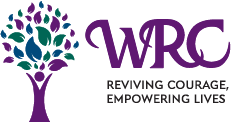May is Mental Health Awareness Month. This month is about raising awareness on the importance of mental health and stopping the shame and stigma surrounding mental health illnesses. Mental health illnesses are among the most common causes of disability and it is estimated that one in five adults will experience mental illness each year. It is important to recognize warning signs and find out ways to reach out for help.
Mental health illnesses may possess moderate to severe warning signs. These warning signs consist of but are not limited to, excessive sadness or irritability, significant high and low mood changes, consistent fear, worry, or anxiety, social withdrawal, and changes in eating or sleeping habits. If you or someone you know may have symptoms, it is important to ask questions, learn, and advocate.
Mental health awareness is a key part in many survivors’ journey to empowerment after experiencing gender-based violence. The trauma endured by domestic violence can have significant mental health consequences. People may believe that perpetrators and abusers makeup large percentages for mental illnesses when in fact, a substantial amount of mental health illnesses stem from being a victim of domestic violence. According to the American Psychiatric Association, approximately 20% of intimate partner violence survivors reported experiencing a new onset of psychiatric disorders such as major depressive disorder (MDD), generalized anxiety disorder (GAD), and posttraumatic stress disorder (PTSD) and a wide range of substance use disorders. This trauma can affect survivors’ regulation of emotions, facial expressions, reading of social cues, and may cause future problems creating new relationships. Furthermore, persistant abuse can result in obsessive compulsive behaviors such as self-harm or suicide. Those who experience domestic violence and mental health face significant barriers on a day-to-day basis. It is important to help change the stigma that surrounds mental health and try to better understand what they’re experiencing.
For many, mental health has shown to be negatively affected by the COVID-19 pandemic. Signs of poor mental health include social withdrawal, isolation and loneliness — these signs now being a method used to maintain social distancing and stay-at-home orders. Also, feelings domestic violence victims are all too familiar with. A new status where victims and children are trapped alongside their abuser with no reprieve has resulted in a dramatic increase of violent incidents among victims. Quarantine precautions are especially dangerous for victims of domestic violence and their children who are forced into close quarters with their abuser. During this time, we have seen a considerable influx of people reaching out for assistance including low-income families struggling with food and financial insecurity, survivors of sexual assault, victims of domestic violence, and homeless persons. Quarantine precautions and state-wide shelter-in-place recommendations have made it so that many of our clients and community members have suffered wages loss, job loss, and/or loss of childcare that enabled them to work. Many people in our community who were living paycheck-to-paycheck have suffered from this pandemic. COVID-19 impacted their ability to feed, house, and support their households — leaving many at-risk of food insecurity, housing insecurity, and a host of other socioeconomic-driven issues such as healthcare and nutrition. Now more than ever, it is important to be aware of our mental health during COVID-19.
To learn more about common reactions, feelings, and how to cope during COVID-19, click here: https://www.cdc.gov/coronavirus/2019-ncov/daily-life-coping/managing-stress-anxiety.html
Warning signs and symptoms of mental health illnesses:
https://www.nami.org/About-Mental-Illness/Warning-Signs-and-Symptoms
Daily strategies for self-care and awareness:
http://www.ncaa.org/sport-science-institute/topics/covid-19-and-mental-health
Resource Guide from the National Alliance on Mental Illness during COVID-19:
For Immediate Help:
National Suicide Prevention Lifeline – Call 800-273-TALK (8255)
Crisis Text Line – Text NAMI to 741-741
National Domestic Violence Hotline – Call 800-799-SAFE (7233)







